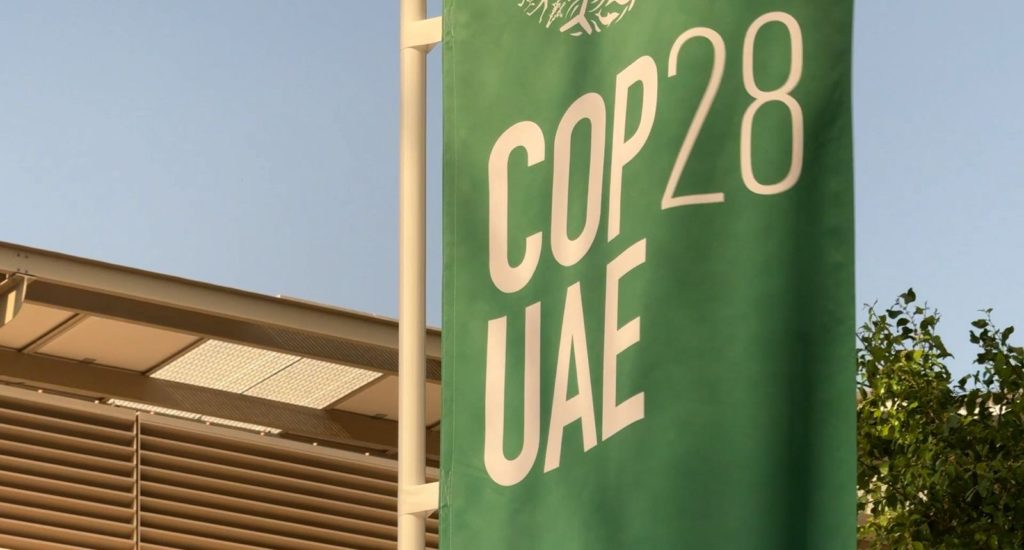Exeter experts give verdict on COP28 deal

University of Exeter researchers have responded to the deal agreed today at the COP28 climate change conference.
The deal contains the first global agreement on “transitioning” away from fossil fuels – but this was watered down from a “phase out”.
Here is what Exeter researchers have to say:
Professor Pierre Friedlingstein, who leads the Global Carbon Budget, said: “People will see this COP28 as success or a total failure. I’m on the positive side here. The final text gives a very clear message that was never present in any of the previous 27 COPs. COP28 calls for a ‘Transition away from fossil fuels in energy systems, so as to achieve net zero by 2050 in keeping with the science.’ Now countries around the world have to put these words into actions. Let’s stop blaming petro states for selling fossil fuels. Let’s focus on making sure our governments give us the option not to buy them.”
Dr James Dyke said: “COP28 needed to deliver an unambiguous statement about the rapid phase out of fossil fuels. That would represent a rupture from previous COPs and business as usual – which is what is needed now, given record-breaking global temperature and greenhouse gas emissions. Unfortunately, that did not happen. While the agreement’s call for the need to transition away from fossil fuels is welcome, it has numerous caveats and loopholes that risks rendering it meaningless when it comes to our efforts to limit warming to well below 2°C. That this deal has been hailed as a landmark is more a measure of previous failures than any step change when it comes to the increasingly urgent need to rapidly stop burning coal, oil and gas.”
Polar expert Professor Martin Siegert said: “The polar regions are heating much faster than the rest of the planet. Protecting these pristine environments will limit global sea level, keep the planet from accelerated further heating and maintain the precious ecosystems. The only way to do this is to stop fossil-fuel burning and limit global warming to 1.5C. COP28, by not making a clear declaration to stop fossil fuel burning in line with scientific evidence, is a tragedy for the poles, the planet and our future. While it’s good that COP28 has stated that fossil fuels need to reduce, the agreement on doing so is very weak. The COP28 agreement encourages countries to move away using fossil fuels, but not to ‘phase out’ or even ‘phase down’ their use. Clearly the wording is all that could be agreed at this stage, which is itself a disappointment. The world is heating faster and more powerfully than the COP response to deal with it.”
Professor Gail Whiteman, of the University of Exeter Business School and founder of Arctic Basecamp, said: “Critical climate tipping points in the polar regions will be triggered at +1.5°C. This is a physical limit not a political target. The COP28 agreement recognises this as a defence line but paradoxically only argues for a transition away from fossil fuels rather than a phase-out. Words matter because they provide the wiggle room for business as usual. Phase-out must start now.”
Dr Raphaëlle Haywood said: “The final report from COP28 is disappointing, but it does not change reality: we need to phase out fossil fuels now regardless of the words on the page. The era of fossil fuels is over.”
Dr Mike O’Sullivan, a co-author of the Global Carbon Budget, said: “COP is meant to be the vehicle for solutions, but all it seems to do is recognise problems that the rest of the world identified years ago. It’s obvious to most people that limiting global warming meant reduced fossil fuel use, but only now do our leaders say this. But so what? Where are the real global plans for the energy transition, without relying on fanciful tech solutions, with adequate support for poorer nations? Where is the global leadership to take the right action, not the selfish action? Across the globe, there are plans to expand fossil production – how does this fit with the text that’s just been agreed? It’s clear what we need: the wealthiest in society should pay for the transition. We need a mass redistribution of wealth, otherwise why will poorer nations listen to anything we’ve got to say?”

Dr David Armstrong McKay said: “Including the need to transition away from fossil fuels in energy is a welcome step after nearly three decades of COPs avoiding naming the key problem. However, the necessary fossil fuel phase-out across the board is left out, and there isn’t a binding plan to reduce emissions – countries are invited but not required to pursue a number of actions, including tripling renewable energy by 2030 on the one hand but also leaving the door open to continued oil and gas expansion and various climate boondoggles like large-scale carbon capture on the other. Missing too is a commitment by developed countries to fund equitable fossil fuel phase-out in the Global South, and financial pledges for adaptation and loss & damage are far below what is already needed even at current warming levels. As with most COPs, some incremental progress has been made – but transformational action is required for the Paris Agreement to survive.”
Professor Richard Betts, Chair in Climate Impacts, University of Exeter and Met Office Hadley Centre, said: “The first global stocktake quotes lots of sound science highlighting the severity of the situation we are in, and this is to be applauded. However, it’s worrying that the Dubai negotiations went ahead on the basis of a misunderstanding of how close we are now to reaching 1.5°C global warming. The text gives observed warming as ‘about 1.1°C’, but this is already out of date – the actual current global warming level is about 1.3°C. While this is clearly not the main reason why the agreement falls short of what is needed, it may have contributed to a reduced sense of urgency.”
Professor Ben Groom, Dragon Capital Chair in Biodiversity Economics, said: “The agreement refers to ‘transitioning away from fossil fuels’, an ambiguous phrase that reflects the extent of the compromise required with petrostates to come away from COP28 with any agreement whatsoever. The agreement is heavy on promises in the future to improve the coverage of renewable energy and “phase out” subsidies to fossil fuels (outside of a just transition). Pledges for one off contributions to the Loss and Damage fund were agreed early on in COP28 and together with statements on fossil fuels, improved technology and reduced subsidies, most of the ingredients for achieving the Paris Targets are there. Unfortunately, the language is weak, the finance is insufficient and the time horizons are unspecified, when in fact the actions required are urgent. Yet, we are talking about a voluntary international agreement on an issue with short-term and long-term winners and losers. Broad yet shallow agreements are disappointing yet typical in such situations.”
At COP28, a team led by the University of Exeter published the first Global Tipping Points Report. The COP28 deal includes a mention of climate tipping points, recognising the need for more knowledge and action to prevent them.
Dr Steve Smith, a co-author of the report, said: “I’m incredibly proud of our team of over 200 authors and organisers of the Global Tipping Points Report. Earth system tipping point risks have succeeded in being recognised in the first global stocktake decision. In the coming months and years, we must redouble our efforts to explain the equal urgency of positive tipping points solutions.”



